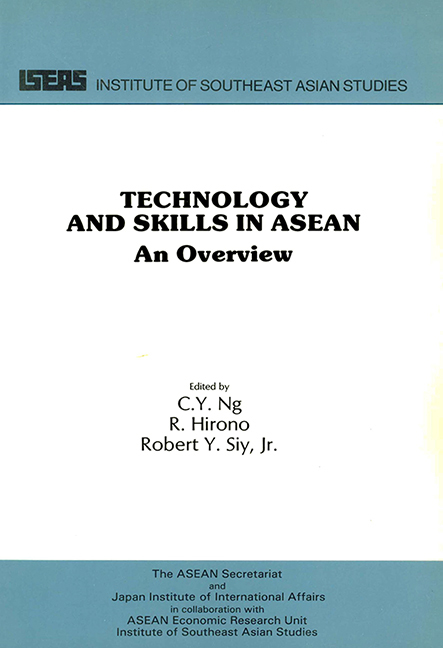Book contents
- Frontmatter
- Contents
- Foreword
- Preface
- PART ONE ASEAN OVERVIEW
- PART TWO SECTION 1: JAPANESE OVERVIEW
- 1 Industrialization, Technology Transfer and Skills Enhancement in Asean: A Japanese View
- 2 Major Issues of Technology Transfer, Adaptation, Diffusion, and Development, and Skills Enhancement
- 3 Technology Transfer and Development in Asean: Machinery and Electronics Industries
- 4 Regional and International Arrangements For Technology Transfer
- 5 Conclusions and Recommendations
- PART TWO SECTION 2: JAPANESE EXPERIENCES IN TECHNOLOGY TRANSFER
- The Editors
2 - Major Issues of Technology Transfer, Adaptation, Diffusion, and Development, and Skills Enhancement
from PART TWO - SECTION 1: JAPANESE OVERVIEW
Published online by Cambridge University Press: 09 November 2017
- Frontmatter
- Contents
- Foreword
- Preface
- PART ONE ASEAN OVERVIEW
- PART TWO SECTION 1: JAPANESE OVERVIEW
- 1 Industrialization, Technology Transfer and Skills Enhancement in Asean: A Japanese View
- 2 Major Issues of Technology Transfer, Adaptation, Diffusion, and Development, and Skills Enhancement
- 3 Technology Transfer and Development in Asean: Machinery and Electronics Industries
- 4 Regional and International Arrangements For Technology Transfer
- 5 Conclusions and Recommendations
- PART TWO SECTION 2: JAPANESE EXPERIENCES IN TECHNOLOGY TRANSFER
- The Editors
Summary
As mentioned earlier, the most dominant channel of technology transfer, adaptation and diffusion and skills enhancement through foreign multinationals in the ASEAN countries has been the establishment of manufacturing, distribution and/or servicing facilities. In establishing and operating such facilities, local firms, whether partially or wholly foreign-owned, import foreign technologies and manpower in accordance with the needs, requirements and constraints prevailing upon them in their countries and the sellers of such technologies in the source countries, often their foreign parent firms.
With respect to technology transfer, adaptation and diffusion and skills enhancement, five major issues have been confronting foreign manufacturing subsidiaries operating in the ASEAN countries. They are: 1) the appropriateness of the technology transferred from overseas in terms of the level, types, cost and other terms and conditions; 2) the adaptation and diffusion of the technology transferred; 3) the development of indigenous R&D capabilities; 4) the improvement of operating and management skills in the recipient countries; and 5) the limitations of regional and international arrangements for technology transfer and development. It is obvious under any circumstances that the enhancement of the technical, professional and management skills of the local manpower is of crucial importance to the effective transfer, adaptation and diffusion of foreign technologies and the development of indigenous technologies in the recipient countries.
Appropriateness of Technology Transferred from Overseas
A concern has been raised from time to time with the question of how far the products and production processes introduced by foreign manufacturing subsidiaries operating in the ASEAN countries are appropriate in terms of the needs and capacity of the respective peoples, the size of the respective domestic markets, and factor endowments. Complaints have at times been heard about the over-sophistication of the manufactured products in terms of design, quality and packaging, and the excessively capital-intensive nature of the production processes which is inappropriate in the labour-surplus developing economies.
- Type
- Chapter
- Information
- Technology and Skills in ASEANAn Overview, pp. 87 - 96Publisher: ISEAS–Yusof Ishak InstitutePrint publication year: 1988

